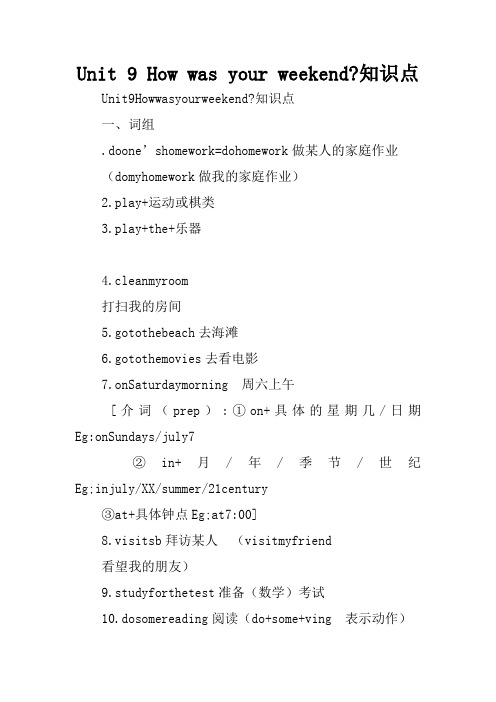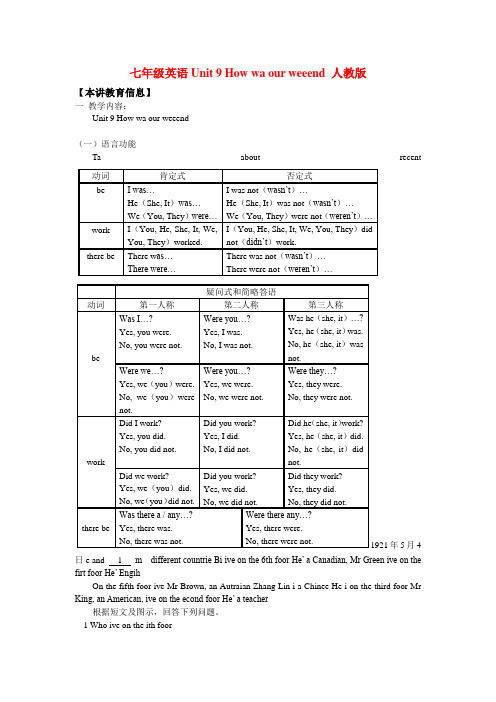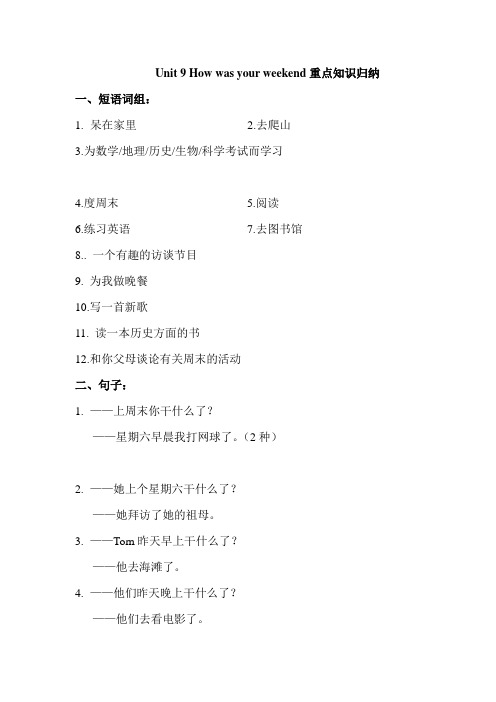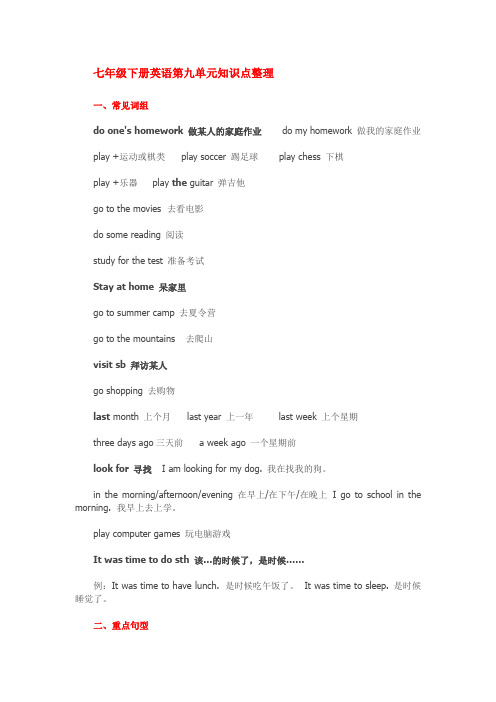英语:Unit 9 How was your weekend语法复习(人教新目标七年级下)
- 格式:doc
- 大小:62.00 KB
- 文档页数:3

Unit 9 How was your weekend?知识点Unit9Howwasyourweekend?知识点一、词组.doone’shomework=dohomework做某人的家庭作业(domyhomework做我的家庭作业)2.play+运动或棋类3.play+the+乐器4.cleanmyroom打扫我的房间5.gotothebeach去海滩6.gotothemovies去看电影7.onSaturdaymorning 周六上午[介词(prep):①on+具体的星期几/日期Eg:onSundays/july7②in+月/年/季节/世纪Eg;injuly/XX/summer/21century③at+具体钟点Eg;at7:00]8.visitsb拜访某人(visitmyfriend看望我的朋友)9.studyforthetest准备(数学)考试10.dosomereading阅读(do+some+ving 表示动作)[dosomewashing洗衣服dosomecooking做饭dosomeshopping购物]1.stayathome呆在家里12.haveaparty举行一个晚会13.practiceEnglish练习英语[practicedoingsth练习做某事(类似用法:like,enjoy,havefun)]14.studygeography学习地理15.goshopping去购物(go+v.ing表示“去做某事”)[goswimming去游泳goboating去划船goclimbing去爬山]6.playcomputergames玩电脑游戏7.gotosummercamp去夏令营18.gotothemountains去爬山19.goforawalk散步20.readabookabouthistory读一本历史书21.seeaninterestingtalkshow看一个有趣的访谈节目22.writeanewsong写一首新歌23.spendtheweekend度假[spendsometime/moneydoingsth花费时间/金钱做某事spendsometime/moneyonsth在某事上花费时间/金钱做某事]24.lookfor寻找(的动作)find寻找(的结果)[Eg:IlookedforeverywherebutIcouldn’tfindmykey. 我找了所有的地方,都没有找到我的钥匙。

七年级英语Unit 9 How wa our weeend 人教版【本讲教育信息】一教学内容:Unit 9 How wa our weeend(一)语言功能Ta about recent1921年5月4日e and 1 m different countrie Bi ive on the 6th foor He’ a Canadian, Mr Green ive on the firt foor He’ EngihOn the fifth foor ive Mr Brown, an Autraian Zhang Lin i a Chinee He i on the third foor Mr King, an American, ive on the econd foor He’ a teacher根据短文及图示,回答下列问题。
1 Who ive on the ith foor______________________________________________2 I the man on the econd foor a teacher______________________________________________3 Where’ man on the third foor from______________________________________________4 Who ive one foor beow Bi______________________________________________5 Who ie itening to muic from the ing三、1 over the weeend 2 on Sunda morning 3 didn’t have a good weeend4 in an accident5 a few da ago/ evera da ago6 for a ong time7 Nobod now 8 got home ate四、1 wa/ were 2 did 3 went 4 e 2 What ie doe 3 went with on4 Where China4 Mr Brown ive one foor beow Bi5 Bi doe十一、David’ YeterdaDavid wa ver bu eterda He got ue to choo He had unch at choo After choo, he ef After uewor for about 2 hour He went to bed at 10:40。

Unit 9 How was your weekend重点知识归纳一、短语词组:1.呆在家里2.去爬山3.为数学/地理/历史/生物/科学考试而学习4.度周末5.阅读6.练习英语7.去图书馆8.. 一个有趣的访谈节目9. 为我做晚餐10.写一首新歌11. 读一本历史方面的书12.和你父母谈论有关周末的活动二、句子:1.——上周末你干什么了?——星期六早晨我打网球了。
(2种)2.——她上个星期六干什么了?——她拜访了她的祖母。
3.——Tom昨天早上干什么了?——他去海滩了。
4.——他们昨天晚上干什么了?——他们去看电影了。
5.——周末过得怎么样,托尼?——太棒了/还可以.6. ——萨拉的假期过得怎么样?——不太好。
她打扫房间了而且还为语文考试学习。
7. 他坐下来看小狗汪汪和一只友好的黑猫玩8. 他没狗也没家了。
三、用所给单词的适当形式填空。
1. I often practice __________ (speak) English with my father.2. When it (rain), I stayed at home and watched TV.3. We (be) in Dalian last year.4. It’s time for the students ________ (read) English.5. What day (be) it yesterday?6. I often help parents _____ (do) some housework.IV写出下列单词的过去式1.do 7.see 13.look2.read 8.go 14.cook3.write 9.is 15.ask4.play 10.are 16practice5.study 11. watch 17.have6.spend 12.sit 18.clean。

七年级下册英语第九单元知识点整理一、常见词组do one's homework 做某人的家庭作业 do my homework 做我的家庭作业play +运动或棋类 play soccer 踢足球 play chess 下棋play +乐器play the guitar 弹吉他go to the movies 去看电影do some reading 阅读study for the test 准备考试Stay at home 呆家里go to summer camp 去夏令营go to the mountains 去爬山visit sb 拜访某人go shopping 去购物last month 上个月 last year 上一年last week 上个星期three days ago三天前 a week ago 一个星期前look for 寻找 I am looking for my dog. 我在找我的狗。
in the morning/afternoon/evening 在早上/在下午/在晚上 I go to school in the morning. 我早上去上学。
play computer games 玩电脑游戏It was time to do sth 该…的时候了,是时候……例:It was time to have lunch. 是时候吃午饭了。
It was time to sleep. 是时候睡觉了。
二、重点句型(1)-How was your weekend? 你的周末过得怎么样?--It was great./OK 太好了。
/不错。
(2)-It was time to go home. 是时候回家了三:单元语法一般过去时态一般过去时态表示过去发生的动作或存在的状态,动词通常用一般过去式来表示,除动词be的过去式was/were有人称变化,其他都没人称的变化。
I was a doctor . 我过去是一个医生。

初一英语Unit 9 How was your weekend?【本讲主要内容】Unit 9 How was your weekend?通过本课的学习我们应该能做下面的事:1. 学会动词的过去式。
2. 学会使用过去时。
3. 学会介词后接动名词的用法。
4. 学会过去时描写自己曾做过的事和他人曾做过的事。
【知识掌握】【知识点精析】一. 文化背景由于英语中有时态的要求,即不同的时态有不同的表达法,因此大家在学习时,注意积累,准确记忆。
这也是学好英语的基本要求。
二. 词汇用法本单元所涉及的短语及用法1. go 动词译为去, 动身go to sleep/go to bed 去睡觉go home 回家go to the movies去看电影go shopping去购物go for a walk 去散步go wrong 变坏,出毛病go over 复习,浏览go ahead 前面走,尽管去做go in for 从事于物做主语,表示运行Everything goes well. 一切顺利。
go 名词译为尝试Do you want a go? 你想尝试吗?be going to 打算,计划做某事用于一般将来时We are going to have a party at school next Sunday.have/has gone to 去某地了They have gone to New York. 他们去纽约了。
They have been to New York. 他们去过纽约。
have gone to 是指某人去某地,且人没回来。
也就是人不在本地。
have been to是某人去过某地了,且人已经回来了,也就是人目前在本地。
go on doing sth. 继续做某事After a break, he went on his speaking.停顿了一会,他继续他的讲话。
go on to do sth. 接着做(另一件事)He brushed his teeth, and went on to wash his face.他刷完牙,接着又洗脸。

七年级英语下册第七单元Unit 9 How was your weekend?知识点整理七年级英语下册第七单元Unit9Howwasyourweekend?知识点整理第九单元Unit9Howwasyourweekend?本单元重点是掌握How引导的特殊疑问句,复习一般过去时。
一般过去时用法:一般过去时表示过去某个时间发生的动作或存在的状态,常和表示过去的时间状语连用,如:yesterday,lastnight/year,once,in990,twodaysago等。
也可表示过去经常或反复发生的动作,常与often,always等表示频度的时间状语连用。
例如:①Igotupat6:30yesterday.昨天我在六点半起床。
②ShewasamiddleschoolstudentinXX.在二零零年她是一个中学生。
③Healwayswenttoschoolbybuslastyear.去年他总是乘公共汽车去上学。
形式:一般过去时的形式为“主语+动词过去式”。
①动词be第一人称单数和第三人称单数用was,其余一律用were;②动词have/has一律用had,没有人称和数的变化;③行为动词一律用过去式,没有人称和数的变化;一般过去时的句型:肯定句句型:主语+动词过去式。
例如:①Iwatchedthefilmtwodaysago.两天前我看了这部电影。
②marywasadocterinXX.在XX年玛丽是一名医生。
③Thestudentsplayedbasketballyesterday.昨天学生们打篮球了。
④Sheboughtanotebooklastweek.上个星期她买了一个笔记本。
否定句句型:①主语+wasn't/weren't+其他②主语+didn't+动词原形。
以上四句的否定句依次为:①Ididn'twatchthefilmtwodaysago.两天前我没有看这部电影。
Unit 9 How was your weekend?一、教学内容:Unit 9 How was your weekend?【具体教学过程】(一)语言功能:Talk about past events 谈论过去的事情(二)目标语言:1. How was your weekend? It was great./ It wasn’t very good.2. What did you do last weekend? I/ We played soccer.3. What did she/ he do last night? She/ He did homework.(三)重点单词和词组1. stay v. 停留,留下Can you stay for dinner? 你能留下来吃晚饭吗?We stayed at home last weekend. 上周末我们呆在家里用于系表结构,后接形容词,译为“保持”表示处于什么状态We must stay healthy.我们必须保持健康。
The window stayed open all the night. 这窗户整夜开着。
2. mountain 山,山岳高大陡峭的高山。
hill 小山,丘陵指比mountain小的山3. practice v 练习,训练后跟名词、代词和动名词。
I practice tennis for an hour a day. 我每天练习一小时网球。
She is practicing playing the piano at home .她正在家练习钢琴。
n. 练习,训练,实践Practice makes perfect. 熟能生巧练一练Tom ______ Chinese with me last weekend.A. practices speakingB. practiced spokenC. practiced speakingD. practiced to speak.4. spend v 度过,消磨时间后跟表示时间的名词I spent a month in France last summer. 去年夏天我在法国呆了一个月spend 花费时间或金钱spend…on sth. spend …(in) doing sth.I spent a lot of money on books last year. 我去年买书花了许多钱。
Unit 9 How was your weekend?一,一般过去时定义:表示在过去的时间里发生的动作或状态。
肯定式:谓语动词用过去式 Eg: My weekend was great.疑问式:连系动词be的疑问句,把句中的was、were提到句首实义动词的疑问句在句首加助动词did,后用动词原形。
否定式:连系动词be的否定句,在was、were后加not实义动词的否定句在实义动词前加didn't,谓语动词用动词原形。
动词过去式构成:一般的在动词词尾后加ed以e结尾的动词在e后加d重读闭音节并且末尾只有一个辅音字母的,双写该辅音字母再加ed以辅音字母加y结尾的词,变y为i加ed不规则的特殊记:用法:一般过去时表示过去某一确定时间内发生的动作或存在的状态,经常与表示过去的时间状语连用。
1. last week \month \year2. yesterday3. t he daybefore yesterday4. 时间段+ago5. in+年6. just now7. this morning二, spend 、pay、 take 、cost区别Spend:其主语必须是人。
Spend time\money on sth Spend ……(in) doing sthPay: 其主语必须是人。
不能表示花费时间。
Pay……for……Take :其主语必须是物。
(it)It takes sb some time to do sthCost:表示花费钱,主语是物。
三. A few ,few的区别A few 修可数名词,表肯定。
“有一些”Few: 修可数名词,表否定“几乎没有”重点词组have a party stay at home play tennis do some reading clean one's room go to the cinema go shopping talk show go to the beach practice doing sth study for the test do one's homework go for a walk have a good trip have a bath=take a shower spend……(in)sth spend on sth enjoy doing sth watch sb do sth watch sb doing sth It's time to do sthIt takes sb some time to do sth花费某人多长时间去做某事。
Unit 9 How was your weekend?一、词组1.do one’s homework=do homework 做某人的家庭作业(do my homework 做我的家庭作业)2.play +运动或棋类(如:play soccer 踢足球play chess 下棋)3.play +the+乐器(如:play the guitar 弹吉他)4.clean my room 打扫我的房间5.go to the beach 去海滩6.go to the movies 去看电影7. on Saturday morning周六上午(in the morning/afternoon/evening 在早上/在下午/在晚上)[介词(prep): ① on + 具体的星期几/ 日期Eg: on Sundays/ July 7② in + 月/年/季节/世纪Eg; in July/ 2006/ summer/ 21century③ at + 具体钟点Eg; at 7:00]8. visit sb 拜访某人(visit my friend 看望我的朋友)9. study for the (math) test 准备(数学)考试10. do some reading 阅读(do+some+ving表示动作)[do some washing洗衣服do some cooking做饭do some shopping购物]11. stay at home 呆在家里12. have a party 举行一个晚会13. practice English 练习英语[practice (practiced) doing sth 练习做某事(类似用法:like, enjoy, have fun)]14.study geography 学习地理15. go shopping 去购物(go+v.ing 表示“去做某事”)[go swimming去游泳go boating去划船go climbing 去爬山]16. play computer games 玩电脑游戏17. go to summer camp 去夏令营18. go to the mountains 去爬山19. go for a walk 散步20.read a book about history 读一本历史书21.see an interesting talk show 看一个有趣的访谈节目22.write a new song 写一首新歌23. spend the weekend 度假[spend (spent) sometime / money (in) doing sth花费时间/金钱做某事spend (spent) sometime / money on sth 在某事上花费时间/金钱做某事]24. look for 寻找(的动作)find (found) 寻找(的结果)[Eg: I looked for everywhere but I couldn’t find my key.我找了所有的地方,都没有找到我的钥匙。
Unit 9 How was your weekend 一.短语
1. play +运动play soccer play tennis play sports
play the + 乐器play the guitar
play with…和某人\物玩耍
2.have +三餐have breakfast lunch supper
3. study for… clean the room visit sb stay at home
have a party talk show
4.go to the beach go to the movies go for a walk go to the mountains 5.go shoppingdo some shopping go to the shop 买东西
6.last weekend\over the weekend 上周末on weekends 每周末7.on +某日+morningafternoonevening in + morningafternoonevening in+年\月\季节at +时刻last (next) month\yearweek 8.what about+nv-ingpren=how about ……呢
9. spend the weekend last week 度过上周的周末
10.it’s time to do sth=it’s time for sth 该做么的时候了
11.look for寻找.....
二,重点句型和语法
1.一般过去时
表示过去发生的动作或存在的状态,通常与
过去的时间状语连用:
yesterday ,last week(month,year)
(1)系动词be的过去时: am(is) →was, are →were
陈述句:He was at home yesterday.
否定句:He wasn’t at home yesterday.
疑问句:Was he at home yesterday?
Yes ,he was./No ,he wasn’t.
(2)行为动词的一般过去时:
陈述句:主语+动词过去式+其它
I go to the movie. →I went to the movie.
否定句:主语+助动词didn’t+动词原形+其它
I don’t go to school today. →I didn’t go to school.
一般疑问句:Did +主语+动词原形+其它
Do you have breakfast? →Did you have breakfast?
Yes,I do./No,I don’t. Yes,I did./No,I didn’t.
(3)规则动词的过去式变化规则
变化规则例词
一般在词尾加—ed. play→played
以不发音的e结尾的,只加--d. like →liked
love →loved
以辅音字母+y 结尾的,变y为i ,再加—ed. study →studied
carry →carried
以一个辅音字母结尾的重读闭音节,先双写这个辅音字母,再加-ed stop →stopped plan →planned
动词不规则变化:
do →did have →had go →went
see →saw read →read get →got
give →gave sleep →slept eat →ate
write →wrote find_---found
2. what’s the date today? It’s …
3. What was the date yesterday? It was…
4. What’s the weather like today? It’s …?
5. How was your weekend?
6.What did she do ? She did her homework 7.What did he do last weekend ? He played soccer.8.It’s time to go home= It’s time for home
回答人的补充 2011-02-08 01:24。